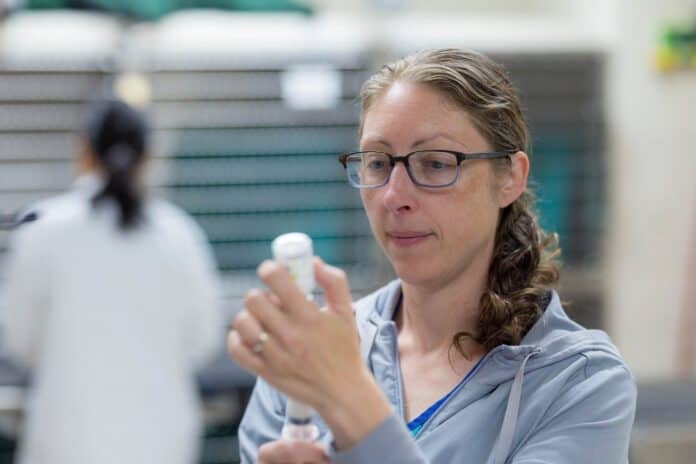When traditional treatments fall short, clinical trials can offer a lifeline for pets and their owners. These carefully designed studies are testing tomorrow’s breakthroughs today—from tumor-targeting ultrasound to early detection methods that could transform veterinary care.
Behind the scenes at Virginia-Maryland College of Veterinary Medicine at Virginia Tech, Robyn Fox ensures these complex trials run smoothly. As the college’s new research coordinator for the clinical trials program, she bridges the gap between innovative research ideas and the practical realities of patient care.
“Clinical trials aren’t just about finding cures,” said Fox, a licensed veterinary technician with more than two decades of experience. “They’re about giving hope when standard options have been exhausted and creating better treatments for future patients.”
What are clinical trials?
Veterinary clinical trials discover new ways to prevent, diagnose, and treat animal diseases. When standard treatments don’t provide enough options, these carefully designed studies test promising new approaches.
“While many trials focus on treatments and potential cures, others are equally important in developing methods to detect diseases earlier,” Fox explained. “Earlier detection can dramatically improve outcomes, even with existing treatments.”
Each trial at the Veterinary Teaching Hospital must pass rigorous safety reviews by both the hospital board and Virginia Tech’s Institutional Animal Care and Use Committee, ensuring patient safety always comes first.
Major funding drives innovation
The Helen Dessin Spurr and Frank Arthur Spurr Jr. Endowed Research Fund for Domestic Canine and Feline Pets, a transformative $15 million estate gift, largely funds this crucial work, generating interest to support small animal research at the college.
Virginia Tech’s impact extends globally. Faculty are helping develop veterinary clinical trials reporting guidelines, ensuring that findings from studies can be properly evaluated and implemented by veterinarians worldwide.
Currently, the hospital manages about 15 ongoing trials with more coming soon, from groundbreaking cancer treatments to heart disease studies in various breeds.
The value of clinical expertise in research
Fox spent 16 years in the teaching hospital as both lead technician and practice manager. This frontline experience gives her unique insights into what makes research work in real-world settings.
“Faculty researchers wanted an LVT to help spot the practical details that might be overlooked,” she said. “When starting a clinical trial, I can anticipate needs based on years of hands-on patient care.”
This practical perspective helps ensure research protocols work smoothly when put into action.
Collaborative problem-solving
“I’m a problem solver by nature,” Fox said. “This position lets me use that skill to help faculty advance veterinary medicine.”
She doesn’t just consult — she participates. During her first week, Fox was already in the treatment room administering anesthesia for histotripsy cases, in which precision ultrasound technology targets tumors.
“I’m watching engineers work with a robotic arm that might someday allow veterinarians to simply liquefy tumors rather than surgically removing them,” she said. “And I get to help make that possible.”
This hands-on approach helps bridge the gap between innovative ideas and practical patient care.
Could a clinical trial help your pet? What’s in it for your pet
Clinical trials offer hope when standard treatments fall short. They provide:
- Access to cutting-edge treatments before they’re widely available
- Care from specialists and extra monitoring
- Potential financial help with hospital visits, surgery, or medications
- A chance to help future pets with similar conditions
“Clinical trials often offer hope when other options have failed,” Fox explains. “They provide innovative treatments that might otherwise be unavailable.”
What you should know
Before enrolling your pet, consider:
- New treatments might have side effects
- Some trials require extra visits or travel
- Not every patient responds to experimental treatments
“We discuss all potential risks before enrollment and provide everything in writing,” Fox emphasizes. “Your pet’s welfare always comes first.”
Need inspiration? Read about Helen and Bambi, who received innovative cancer treatments at Virginia Tech’s Animal Cancer Care and Research Center with remarkable results.
See current studies and enrollment information.
Getting involved
Fox is working to help more pets connect with potentially life-changing trials.
“Many veterinarians simply don’t know what studies are available,” she said. “Better awareness means more options for pets facing difficult diagnoses.”
One story stands out in Fox’s experience: “We had owners drive all the way from Florida for an MRI. Their pet wasn’t doing well, but they came because they wanted to help future patients with similar conditions.”
How to find a clinical trial for your pet
Interested in exploring whether your pet might qualify for a clinical trial?
- Start by talking with your veterinarian about your pet’s condition.
- Browse current studies on the Virginia Tech Clinical Trials webpage.
- Contact the Clinical Trials office directly with specific questions.
- Have your pet’s medical records ready to share.
“Keep checking back,” recommended Fox. “New studies are approved regularly, so today’s options might be different from tomorrow’s.”
By Andrew Mann


